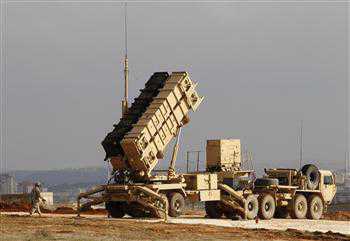BY ANDREA SHALAL-ESA
DUBAI Thu Nov 21, 2013 7:02am EST

Nov 21 (Reuters) – If Turkey buys a missile defense system from China, it would not be able to integrate it with NATO or U.S. systems and would miss out on decades of training, support and upgrades that come with U.S. systems, a top U.S. official said at the Dubai Airshow.
Heidi Grant, Air Force deputy undersecretary for international affairs, said Turkey was a sovereign country and had the right to spend its funds on whatever it liked.
But U.S. officials have explained to Turkey that proceeding with a decision to purchase a system made by a Chinese firm under U.S. sanctions would reduce its ability to coordinate missile defense activities with NATO and the United States.
“If they select a system that’s not inter-operable, that’s their choice. They’ve chosen not to be inter-operable,” Grant told Reuters in an interview. “Our role is to make sure they’re informed of our recommendation of the best systems to be inter-operable with the U.S.”
Grant said military officials around the world were clamoring for increased ability to operate in coalitions with the United States and other partners.
“In the dialogues I have, the partners want to be part of us,” Grant said. “They know that our technology is the most capable technology. They know that we’ll be there for 20-plus years for the sustainment, for the training, for the (concept of operations), and for the upgrades. We’re a trusted partner.”
General Akin Ozturk, the head of the Turkish air force, on Saturday told an air chiefs conference his country’s decision to buy a $3.4 billion missile defense system from a Chinese company was not final, and could still change.
Turkey announced in September it had chosen the FD-2000 long-range air and missile defense system built by China Precision Machinery Import and Export Corp over rival offers from Franco-Italian Eurosam SAMP/T and Raytheon Co.
It said China offered the most competitive terms and would allow co-production in Turkey, but the decision caused alarm in NATO countries worried about China’s growing clout. The Chinese firm is also under U.S. sanctions for violating the Iran, North Korea and Syria Nonproliferation Act.
Reuters reported last week that Raytheon and Lockheed Martin Corp are considering ways to sweeten their offer to build a Patriot missile defense system for Turkey, although no decisions had been made.
Industry executives familiar with the matter this week told Reuters that U.S. government officials had been very pro-active in terms of trying to understand Turkey’s decision and what changes could be made to the U.S. offering.
“The question is what does Turkey want, what does Turkey need to change the decision. That’s really the root of the issue and that is being assessed by the U.S. government right now. It’s truly government led,” said one industry executive who was not authorized to speak publicly.
Industry executives said Raytheon’s Patriot offering was over $1 billion more expensive than the Chinese system chosen by Turkey, but China also offered higher levels of technology transfer and co-production.
“The gap is uncloseable with a price reduction,” said one of the executives.
Turkey’s choice of a Chinese system is complicated by the fact that the manufacturer is under U.S. sanctions for shipping equipment to banned countries.
Turkey has dismissed the notion that any of its defence firms would be blacklisted if they work with CPMIEC.
Murad Bayar, Turkey’s Undersecretary for Defence Industries, told Reuters at a NATO industry forum last week that Turkish firms had worked with China on past weapons deals and he did not expect them to face sanctions given strict rules aimed at ensuring compliance with NATO regulations.
“The procedures on clearance are seriously followed by these companies and we don’t see a big risk in this regard,” Bayar said, adding that Turkey “vigorously” applied the rules.
“The U.S. sanctions on CPMIEC are a result of U.S. legislation and concern the U.S.’s own procurement. This could only involve Turkish companies if there is a violation,” he said. “But … we don’t think such a risk would materialise.”
via AIRSHOW-Turkey’s Chinese missile system won’t work with US, NATO- US official | Reuters.
